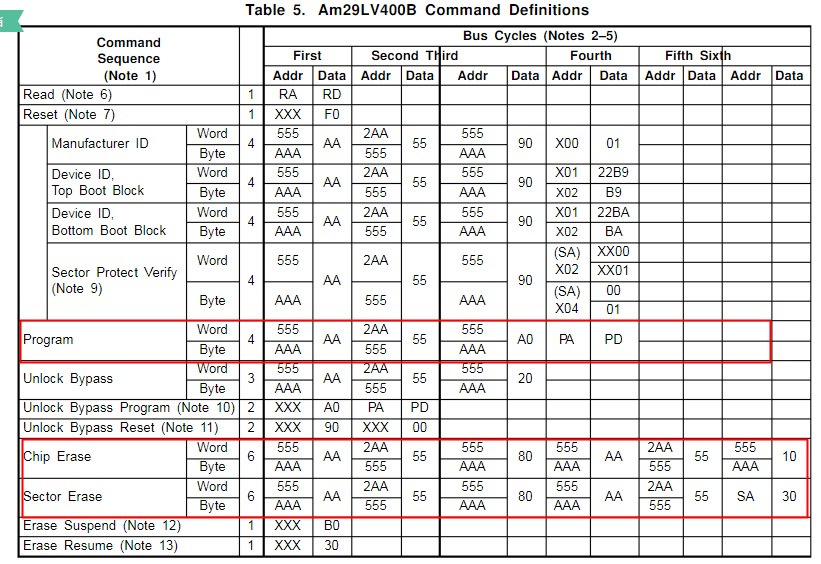1. 硬件接口如下,其中nor flash的使用方法,写的时候和NAND FLASH是一样的,读的时候和DRAM是一样的

2. 看下擦除指令和编程指令

3. 代码如下
#include <csl.h>
#include <csl_pll.h>
#include <csl_emif.h>
#include <csl_chip.h>
#include <stdio.h>
#include <csl_gpio.h>
//#define AM29_FLASH_ADDR_BEGIN (*((unsigned int *)0x200000))
#define AM29_FLASH_ADDR_BEGIN ((unsigned int *)0x200000)
#define DATA_BUF_LEN 20
/*锁相环的设置*/
PLL_Config myConfig = {
0, //IAI: the PLL locks using the same process that was underway
//before the idle mode was entered
1, //IOB: If the PLL indicates a break in the phase lock,
//it switches to its bypass mode and restarts the PLL phase-locking
//sequence
6, //PLL multiply value; multiply 12 times
12 //Divide by 2 PLL divide value; it can be either PLL divide value
//(when PLL is enabled), or Bypass-mode divide value
//(PLL in bypass mode, if PLL multiply value is set to 1)
};
/*SDRAM的EMIF设置*/
EMIF_Config emiffig = {
0x221, //EGCR : the MEMFREQ = 00,the clock for the memory is equal to cpu frequence
// the WPE = 0 ,forbiden the writing posting when we debug the EMIF
// the MEMCEN = 1,the memory clock is reflected on the CLKMEM pin
// the NOHOLD = 1,HOLD requests are not recognized by the EMIF
0xFFFF, //EMI_RST: any write to this register resets the EMIF state machine
0x3FFF, //CE0_1: CE0 space control register 1
// MTYPE = 011,Synchronous DRAM(SDRAM),16-bit data bus width
0xFFFF, //CE0_2: CE0 space control register 2
0x00FF, //CE0_3: CE0 space control register 3
// TIMEOUT = 0xFF;
0x1FFF, //CE1_1: CE0 space control register 1
// Asynchronous, 16Bit
0xFFFF, //CE1_2: CE0 space control register 2
0x00FF, //CE1_3: CE0 space control register 3
0x1FFF, //CE2_1: CE0 space control register 1
// Asynchronous, 16Bit
0xFFFF, //CE2_2: CE0 space control register 2
0x00FF, //CE2_3: CE0 space control register 3
0x1FFF, //CE3_1: CE0 space control register 1
0xFFFF, //CE3_2: CE0 space control register 2
0x00FF, //CE3_3: CE0 space control register 3
0x2911, //SDC1: SDRAM control register 1
// TRC = 8
// SDSIZE = 0;SDWID = 0
// RFEN = 1
// TRCD = 2
// TRP = 2
0x0410, //SDPER : SDRAM period register
// 7ns *4096
0x07FF, //SDINIT: SDRAM initialization register
// any write to this register to init the all CE spaces,
// do it after hardware reset or power up the C55x device
0x0131 //SDC2: SDRAM control register 2
// SDACC = 0;
// TMRD = 01;
// TRAS = 0101;
// TACTV2ACTV = 0001;
};
void delay(unsigned int d_time)
{
unsigned int loop = 0;
while(d_time--)
{
loop = 1000;
while(loop--);
}
}
Uint16 ChipErase(void)
{
Uint16 i,Data;
Uint32 TimeOut;
*(AM29_FLASH_ADDR_BEGIN + 0x555) = 0xAA;
*(AM29_FLASH_ADDR_BEGIN + 0x2AA) = 0x55;
*(AM29_FLASH_ADDR_BEGIN + 0x555) = 0x80;
*(AM29_FLASH_ADDR_BEGIN + 0x555) = 0xAA;
*(AM29_FLASH_ADDR_BEGIN + 0x2AA) = 0x55;
*(AM29_FLASH_ADDR_BEGIN + 0x555) = 0x10;
i = 0;
TimeOut = 0;
delay(8000);
while(i<5)
{
Data = *(AM29_FLASH_ADDR_BEGIN + 0x1FF);
if (Data == 0xFFFF) i++;
else i=0;
if ( ++TimeOut>0x1000000) return (0);
}
for (i=0;i<0x400;i++)
{
Data = *(AM29_FLASH_ADDR_BEGIN + i);
if (Data !=0xFFFF) return (0);
}
return (1);
}
Uint16 FlashWrite(Uint32 RomStart, Uint16* buf_start, Uint16 Length)
{
Uint32 i,TimeOut;
Uint16 Data1,Data2,j;
for (i=0;i<Length;i++)
{
*(AM29_FLASH_ADDR_BEGIN + 0x555)= 0xAA;
*(AM29_FLASH_ADDR_BEGIN + 0x2AA)= 0x55;
*(AM29_FLASH_ADDR_BEGIN + 0x555) = 0xA0;
*(AM29_FLASH_ADDR_BEGIN + RomStart + i) = *(buf_start++);
TimeOut = 0;
j=0;
delay(10);
}
while(j<5)
{
Data1 = *(AM29_FLASH_ADDR_BEGIN + RomStart + i);
Data2 = *(AM29_FLASH_ADDR_BEGIN + RomStart + i);
if (Data1 == Data2) j++;
else j=0;
if ( ++TimeOut>0x1000000) return (0);
}
return (1);
}
void FlashRead(Uint32 RomStart, Uint16* buf_start, Uint16 Length)
{
Uint32 i;
for (i=0;i<Length;i++)
{
*(buf_start++) = (*((volatile unsigned int *)(AM29_FLASH_ADDR_BEGIN + RomStart + i)));
}
}
main()
{
Uint16 data_buf[DATA_BUF_LEN] = {0};
unsigned int i = 0;
Uint16 write_buf[DATA_BUF_LEN] = {0x0001,0x0002,0x0003,0x0004,0x0005,0x0006,0x0007,0x0008,0x0009,0x0000,
0x0011,0x0012,0x0013,0x0014,0x0015,0x0016,0x0017,0x0018,0x0019,0x0010};
unsigned int test_data = 0;
/*初始化CSL库*/
CSL_init();
/*EMIF为全EMIF接口*/
CHIP_RSET(XBSR,0x0a01);
/*设置系统的运行速度为144MHz*/
PLL_config(&myConfig);
/*初始化DSP的EMIF*/
EMIF_config(&emiffig);
/*确定方向为输出*/
GPIO_RSET(IODIR,0xFF);
GPIO_RSET(IODATA,0x00);
ChipErase();
FlashWrite(0, write_buf, DATA_BUF_LEN);
delay(1000);
FlashRead(0, data_buf, DATA_BUF_LEN);
for(i=0;i<DATA_BUF_LEN;i++)
{
if(write_buf[i] != data_buf[i])
{
printf("test data error:%d",i);
}
}
if(i == DATA_BUF_LEN)
{
printf("test data ok");
}
for(;;);
}